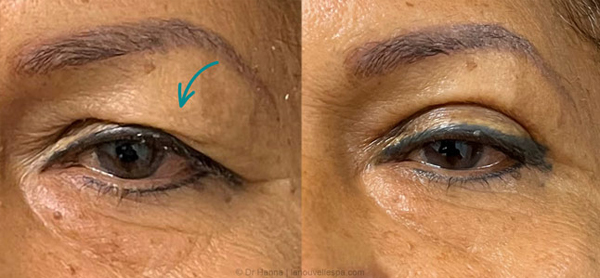Upper blepharoplasty
Upper Blepharoplasty, also known as Upper Eyelid Surgery, is a cosmetic or functional surgical procedure that removes excess skin, fat, and sometimes muscle from the upper eyelids. It is designed to improve the appearance of the eyes and restore a more youthful and refreshed look. It can also address functional issues like vision obstruction caused by drooping eyelids.
Purpose of Upper Blepharoplasty
-
Aesthetic Enhancement:
- Reduces droopy or sagging upper eyelids for a younger, more vibrant appearance.
-
Functional Improvement:
- Corrects impaired vision caused by excess eyelid skin.
-
Symmetry and Balance:
- Improves eyelid symmetry for a more balanced facial appearance.
Procedure Overview
1. Consultation:
- Discuss concerns, medical history, and desired outcomes.
- Evaluation of eyelid structure, skin elasticity, and vision obstruction (if present).
2. Preparation:
- Avoid smoking, blood-thinning medications, and certain supplements before surgery.
- Arrange for transportation and post-surgical care if necessary.
3. During the Surgery:
- Typically performed under local anesthesia with sedation or general anesthesia.
- An incision is made along the natural crease of the upper eyelid.
- Excess skin, fat, and muscle are removed or repositioned.
- The incision is closed with fine sutures to minimize scarring.
4. Duration:
- The procedure usually takes 1-2 hours.
Recovery Process
-
Immediate Recovery:
- Mild swelling, bruising, and tightness are common for the first few days.
- Pain is generally mild and managed with prescribed medications.
-
Activity Restrictions:
- Avoid strenuous activities, heavy lifting, and bending over for 1-2 weeks.
- Keep the head elevated to reduce swelling.
-
Healing Timeline:
- Most swelling and bruising subside within 1-2 weeks.
- Final results are visible after 4-6 weeks, with scars continuing to fade over several months.
Benefits of Upper Blepharoplasty
- Enhances eye appearance, making the eyes look more open and youthful.
- Improves peripheral vision obstructed by sagging skin.
- Provides long-lasting results with minimal scarring.
Risks and Complications
- Scarring: Incisions are well-hidden in the natural eyelid crease, but scars are possible.
- Dry Eyes: Temporary dryness may occur post-surgery.
- Infection or Bleeding: Rare with proper care and precautions.
- Asymmetry: Slight differences in eyelid appearance may occur and can be corrected.
Ideal Candidates
- Individuals with sagging or drooping upper eyelids.
- Those experiencing vision obstruction due to excess eyelid skin.
- Healthy individuals without significant medical conditions affecting healing.
Post-Surgical Care
- Apply cold compresses to reduce swelling and bruising.
- Use prescribed ointments or eye drops to prevent dryness and infection.
- Avoid rubbing or touching the surgical site.



